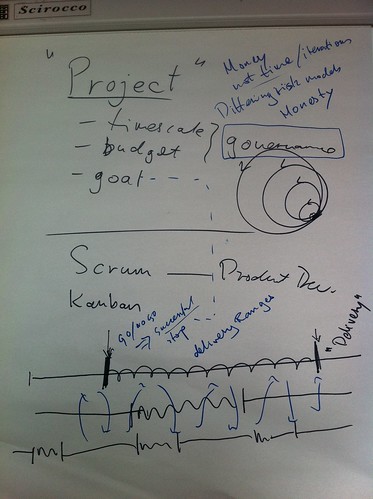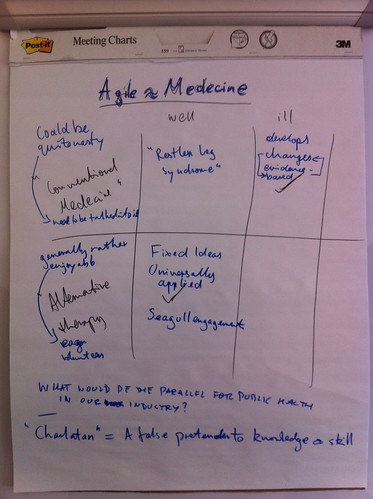At the
2011 UK Agile Coaches Gathering at
Bletchley last week I convened a session which was prompted by comments like
this one from reddit user
grauenwolf:
I used to think people like you were quacks, but now I see that there are teams that really need your services.
Grauenwolf and I have both been on reddit or a good long while and we've had a few...full and frank exchanges of opinion about the merits of this thing called "Agile". The issues I wanted to address in the session were: what causes competent professionals like grauenwolf to think that the sort of people who would go to something like an "Agile Coaches Gathering" are quacks, and what changes their mind? How might we do less of the former and more of the latter?
The output is captured here:
It needs some explanation, though.
"Quack" is an evocative word. "Snake-oil salesman". "Charlatan". We felt that these words appeal to an analogy something along these lines: Agile consultants are like bogus medical practitioners.
The poster shows a 2-by-2 matrix (naturally!): well or ill against conventional medicine or alternative therapy. The model is that conventional medicine is mainly for people who really are ill and need to get better, while alternative therapy is mainly for people who are basically well but feel entitled to be "well-er".
Yes, that is quite cynical. We did talk about the fact that some alternative therapies do work, for the things they work for, but when that happens it's not for the reason that the practitioner thinks. And we talked about how
some conventional medicine is not nearly as well founded as many people would like (you) to think. But, bear with me.
So, the top right and bottom left cells of the chart are the exemplars. Bottom right is the really bad place: trying to treat a mangled road traffic accident victim with a very, very, very dilute solution of London Bus, for example. Top left is pretty bad too: pushing pills for restless leg syndrome and things even less needing of allopathic intervention.
It seems that there is a problem with some kinds of Agile coaching or consulting or training or certification practices. They could be trying to address a really serious organizational problems with techniques that cannot possibly help (and maybe they even know it), or they can be barging in to teams that are functioning perfectly well and crashing about the place changing things that don't need to change.
How could we recognise these cases? Maybe this way:
- conventional medicine often leads to treatment regimes that are quite unpleasant
- people often need to be talked into consulting a conventional medic (partly because of [1])
vs
- alternative therapies are often really rather enjoyable
- people often self-refer to an alternative practitioner (partly because of [1])
How to avoid breaking a working team by spuriously making them "Agile"? Watch out for one-size-fits-all solutions. Watch out for inflexibility, a rejection of new ideas (on the part of the consultant or coach).
How to increase the chances that you're really helping? Look for objective evidence of improvement, change your behaviour based upon that evidence.
The final question we came up with extends the analogy. If Agile coaches are a bit like certain kinds of medical practitioners, then what is the equivalent for us of
public health?

